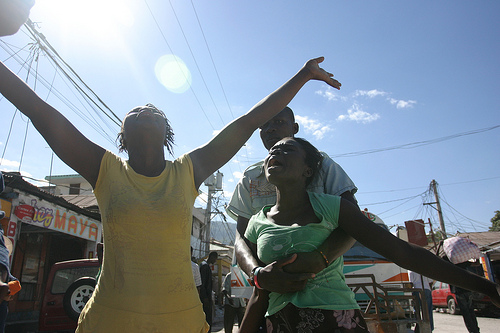Haiti: The Mourning After Pt. 1 (Video)
June 10th, 2010
Along Haiti's Gran Rue (main street), this lady and her family, mourns the loss of her brother, who was killed in the earthquake. Her brother lies dead just out of camera view. (photo: e.parker)
The video posted here was captured on the walk back from Carrefour to Port-au-Prince. My fancy-shmancy video equipment ran out of juice just before the quake and my iPhone followed suit shortly thereafter. We were left with a thin kodak digital camera, that belonged to Vladimir. An outdated model, it had no special gadgets or doohickies. But it did allow for video recording, which helped us to show the magnitude of the suffering. It is taken precisely at day break. In Haiti, at this time, the sun rises in a rush and disappears in an instant. As you can see, it starts out very dark and the sun rises over the wreckage and exposes the tragedy.
These were the first unattended bodies we came upon that morning. Shortly after the quake hit and the buildings shattered, the sun fell as well. You could catch some glimpses of a few dead bodies, but most were still trapped inside. So, when we set out the next day on our journey back to Port-au-Prince, we were unaware of how many people had died, which is why you see me pleading with the UN to “do something” about the dead bodies.
But, as in all disasters of this magnitude, they are focused on taking care of the living. It’s a matter of emergency policy to tend to the living. The dead cannot be helped. But that fact didn’t make it any easier for us who were walking among the bodies that morning.
After baking in the sun, the stench of the carcasses tormented all in smelling distance. In Port-au-Prince, that was everybody. Many were rubbing toothpaste under their noses or shielding their noses with scarfs, kerchiefs, or napkins. By the time I was being evacuated-about 4 days later-the body clean-up had just begun.
When I returned in March, the stench of dead bodies was replaced by the smell of despair, as the rainy season was approaching, threatening the many citizens who now lived in tent cities.
[...] on the sidewalk across from the United Nations base. Unaware of the magnitude of the disaster, I cross the street and ask a UN representative what they can do about the bodies, about the suffering. A women emerges who speaks to me in English. “We got a lot of people inside [...]